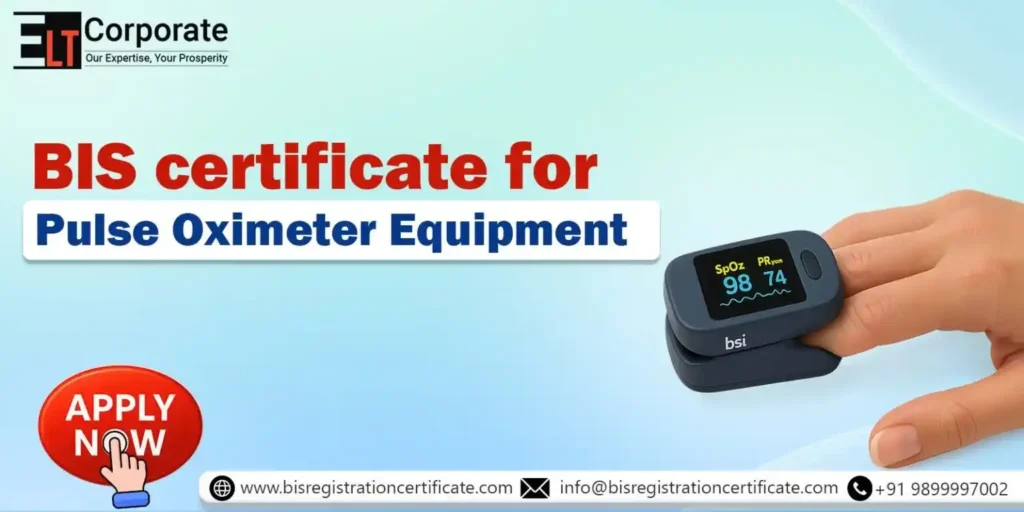Pulse oximeters are important medical tools that check the oxygen levels in the blood and the heart rate. Because they affect a patient’s health, it is necessary to make sure they are safe and work properly. In India, the Bureau of Indian Standards requires a certificate for these and work properly in India, the Bureau of Indian Standerds requires a certificate for these devices. Under the Compulsory Registration Scheme, companies must get BIS approval before selling pulse oximeters in the Indian markets.
In this blog, we are going to read about the BIS Certificate for Pulse Oximeter Equipment complete guide covering its importance, process, and compliance requirements.
What is a Pulse Oximeter?
A pulse oximeter is a non-invasive medical device used to monitor a person’s oxygen saturation (SpO₂) level and pulse rate. It is typically clipped onto a finger, toe, or earlobe, using light sensors to measure oxygen levels in the blood.
Why BIS Certification for Pulse Oximeters Is Necessary
Due to its use in critical healthcare scenarios, a faulty or substandard pulse oximeter can lead to incorrect readings, potentially endangering lives. The BIS Certificate for Pulse Oximeters helps ensure:
- Accuracy and reliability of the device
- Safety for users and healthcare workers
- Quality control during manufacturing
- Consumer protection from counterfeit or poor-quality products
Legal Basis for BIS Certification
1. Bureau of Indian Standards Act, 2016
BIS operates under this Act and is empowered to:
- Establish mandatory certification schemes
- Enforce compulsory use of ISI mark
- Penalize non-compliance
2. Quality Control Orders (QCOs)
The Ministry of Consumer Affairs, Food & Public Distribution, or the Ministry of Health & Family Welfare, issues Quality Control Orders to make BIS certification mandatory for certain medical devices.
As of recent notifications, pulse oximeters have been included under such QCOs and must comply with Indian Standard IS 13540 or other relevant IS standards.
Applicable Standard for Pulse Oximeters
The key BIS standard applicable to pulse oximeters is:
- IS/ISO 80601-2-61:2017
Medical electrical equipment — Particular requirements for basic safety and essential performance of pulse oximeter equipment
This standard aligns with international ISO/IEC guidelines, and ensures:
- Device safety
- Signal accuracy under various conditions
- Electromagnetic compatibility
- User interface performance
Who Needs BIS Certification for Pulse Oximeters?
BIS Certification for Pulse Oximeter is mandatory for the following stakeholders:
| Entity | Certification Requirement |
|---|---|
| Indian Manufacturers | Must obtain BIS license for manufacturing |
| Importers | Must obtain BIS certification prior to import |
| Distributors/Retailers | Must source from BIS-certified suppliers only |
Failure to comply can result in:
- Seizure of products
- Fines
- Legal action under the BIS Act, 2016
Types of BIS Certification Schemes for Pulse Oximeters
BIS provides certification under two major schemes:
1. Scheme-I: ISI Mark Scheme (For Domestic Manufacturers)
- Traditional method involving factory inspection, product testing, and issuance of the ISI mark license
- Applies when the product is manufactured within India
2. Scheme-II: Compulsory Registration Scheme (CRS) (For Electronic Devices)
- Used for electronic products, especially those with IT or electronic components
- For pulse oximeters falling under electronic device category, CRS may also apply
The exact scheme depends on how BIS has notified the product under the relevant QCO.
Step-by-Step Process for BIS Certification of Pulse Oximeters
Here’s a detailed guide for obtaining a BIS Certificate for Pulse Oximeters
Step 1: Determine Product Standard & Scheme
- Identify if the product falls under Scheme-I (ISI mark) or CRS Scheme
- Refer to BIS QCO notification or contact BIS/BIS consultant
Step 2: Prepare Application
Documents Required:
- Factory license or company registration
- Manufacturing process flowchart
- Product technical specifications
- In-house testing facility details (if available)
- Quality control manual (if ISO 13485 certified, it helps)
- Trademark or brand registration (if any)
Forms Used: Form VI (for ISI mark license) and CRS Application (for CRS registration)
Step 3: Product Testing at BIS-Recognized Lab
- Send sample pulse oximeter units to a BIS-approved lab
- Testing will be done against IS/ISO 80601-2-61 standard
- A detailed test report will be issued, covering parameters like:
- Accuracy of SpO₂ and pulse rate
- Battery safety
- Display clarity
- Durability under different temperatures
Step 4: Factory Audit (for ISI License)
- BIS officers conduct an on-site inspection of the manufacturing facility
- Evaluate quality control processes, machinery, raw materials, and lab setup
- Compliance to QMS (preferably ISO 13485 or 9001)
Note: For foreign manufacturers, BIS may require appointing an Authorized Indian Representative (AIR) and conduct foreign inspection or request a video audit.
Step 5: Grant of BIS License
- Upon successful lab test and audit, BIS grants a license:
- ISI Mark License for Scheme-I
- BIS CRS Registration Certificate for CRS
- Valid for 2 years, renewable upon compliance
Step 6: Marking and Sale
- Manufacturers must mark the ISI logo with license number on each device and packaging.
- Importers must ensure the markings before customs clearance.
Markings must be clearly visible, durable, and tamper-proof.
Validity and Renewal of BIS License
Initially valid for 2 years, Renewal every 1 or 2 years
- Updated test reports
- Renewal application
- Fee payment
- Continued compliance
Cost of BIS Certification for Pulse Oximeters
Below we mentioned cost BIS Certificate for Pulse Oximeters:
| Component | Estimated Cost (INR) |
|---|---|
| Application Fee | ₹1,000 – ₹5,000 |
| Testing Fee | ₹25,000 – ₹50,000 |
| Inspection Fee | ₹7,000 – ₹15,000 |
| Consultant Fee (optional) | ₹25,000 – ₹50,000 |
| Total | ₹60,000 – ₹1.2 Lakhs |
Cost varies based on product complexity, location, and whether domestic or foreign manufacturing.
Penalties for Non-Compliance
Under the BIS Act, 2016, non-compliance may lead to:
- Fine up to ₹2 lakhs for the first offence
- ₹5 lakhs for repeat offences
- Imprisonment up to 2 years
- Seizure and recall of unlicensed goods
- Ban on future manufacturing/import
Advantages of BIS Certification for Pulse Oximeters
For Manufacturers
- Access to regulated markets like hospitals, tenders, and government procurement
- Higher consumer trust and brand recognition
For Importers
- Smooth customs clearance
- Compliance with Ministry of Health and BIS mandates
For Consumers
- Assurance of product safety and accuracy
- Protection from counterfeit or substandard devices
BIS CARE App – Verifying Certified Products
Consumers can verify the authenticity of BIS-certified pulse oximeters using the BIS CARE app, which displays:
- Manufacturer details
- License number
- Expiry date
- Product category
This promotes transparency and trust in health devices.
Challenges Faced by Manufacturers
Despite its benefits, BIS certification involves certain challenges:
- Long testing lead times (especially post-pandemic)
- High cost for small-scale manufacturers
- Re-testing required for minor design changes
- Delay in foreign inspections due to visa/travel issues
To mitigate this, BIS is digitizing applications and encouraging more domestic testing laboratories.
Conclusion
The BIS certification for pulse oximeters is not just a bureaucratic requirement—it is a life-saving quality assurance system. It ensures that only safe, reliable, and compliant devices reach the hands of Indian consumers and hospitals.
With health becoming a top priority post-COVID, both the government and consumers are demanding accountability and transparency in medical devices. A BIS-certified pulse oximeter guarantees this trust and opens the doors to a regulated, responsible, and resilient healthcare ecosystem.
Is BIS certification mandatory for medical devices?
Yes, BIS certification is mandatory for specific medical devices under the Compulsory Registration Scheme to ensure safety and quality.
Why is BIS certification required for pulse oximeters?
It ensures the device meets Indian safety, performance, and quality standards before being sold in the market.
Who needs to obtain BIS certification for pulse oximeters?
Manufacturers (domestic or foreign) and importers intending to sell or distribute in India must get certified.








